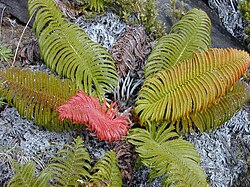| Sadleria | |
|---|---|
 | |
| Sadleria cyatheoides | |
| Scientific classification | |
| Kingdom: | Plantae |
| Clade: | Tracheophytes |
| Division: | Polypodiophyta |
| Class: | Polypodiopsida |
| Order: | Polypodiales |
| Suborder: | Aspleniineae |
| Family: | Blechnaceae |
| Subfamily: | Blechnoideae |
| Genus: | Sadleria Kaulf. |
| Species | |
See text | |
Sadleria is a genus of six species of ferns in the family Blechnaceae, all endemic to Hawaii. [1]